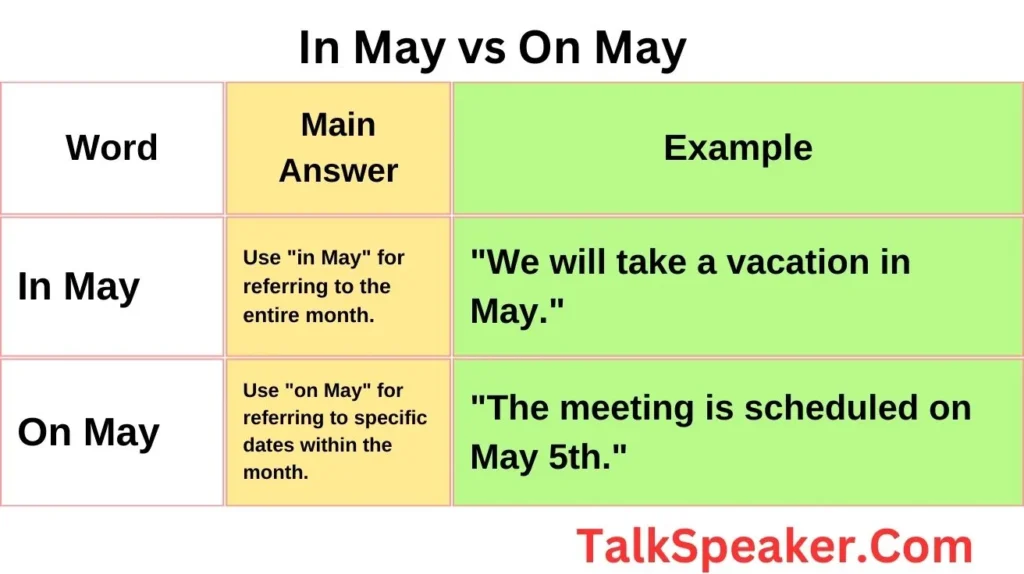Have you ever found yourself puzzled over whether to use “in May” or “on May” when referring to dates?
This confusion is common, but understanding the correct usage of these prepositions can greatly improve your English writing and speaking skills.
Use “in May” for general references to the entire month, and “on May” for specific dates within the month.
In this comprehensive guide, we’ll delve into the proper use of “in May” and “on May,” supported by clear examples and practical tips to help you master English prepositions of time.

Preposition Usage: In May vs On May
| Preposition | Main Answer | Example |
|---|---|---|
| In May | Use “in May” for referring to the entire month. | “We will take a vacation in May.” |
| On May | Use “on May” for referring to specific dates within the month. | “The meeting is scheduled on May 5th.” |
Understanding English Prepositions of Time
Prepositions of time are essential components of English grammar.
They help us articulate when something happens, providing clarity and precision. The most common prepositions of time include at, in, and on. Each serves a specific function:
- At: Used for precise times (e.g., at 3 PM, at noon).
- In: Used for months, years, centuries, and long periods (e.g., in May, in 2024).
- On: Used for days and dates (e.g., on Monday, on May 5th).
By understanding these basic rules, you can accurately express time-related information.
The Correct Usage of “In May”
General Use
“In May” is used when referring to the entire month. It indicates that something happens during the month of May without specifying an exact date. This preposition is perfect for general references.
Examples:
- “In May, the flowers bloom beautifully.”
- “We usually take a vacation in May.”
- “In May, the weather starts to get warmer.”
These sentences show that “in May” encompasses any time within the month.
Seasonal Context
“In May” often ties into broader seasonal references. May is part of spring in the Northern Hemisphere and autumn in the Southern Hemisphere.
This month brings specific weather patterns and activities.
Examples:
“In May, the spring festivals are in full swing.”
Cultural References
May hosts several significant events and holidays. In the United States, Memorial Day is celebrated on the last Monday of May, marking the start of summer activities
Examples:
“In May, we celebrate Memorial Day in the U.S.”
Understanding these cultural contexts helps you use “in May” accurately and appropriately.
Examples in Context for “In May”
Everyday Scenarios
Using “in May” in daily conversations is common. Here are a few examples from various contexts:
Examples:
“In May, my garden is full of roses.”
Formal Contexts
“In May” is also used in formal writing and professional communication.
Examples:
“The annual report will be published in May.”
These examples illustrate how “in May” fits seamlessly into both casual and formal settings.
Exploring the Phrase “On May”
Specific Use
“On May” is used when referring to specific dates within the month.
This preposition specifies an exact day, making it clear when something happens.
Examples:
- “On May 5th, we have a meeting.”
- “She was born on May 25th.”
- “The event is scheduled for on May 30th.”
Using “on May” specifies the exact date, which is crucial for clarity in communication.
Referring to Specific Dates Within May
Precise Dates
When you need to mention a specific date in May, “on May” is the appropriate choice.
This ensures there is no ambiguity about the timing.
Examples:
- “On May 1st, we will begin the new project.”
- “The exam is on May 15th.”
These examples highlight the importance of using “on May” for precise dates.
Examples with Days
Combining the day of the week with the date provides even more specificity.
Examples:
- “On Tuesday, May 10th, the conference will start.”
- “The deadline is on Friday, May 20th.”
This practice is common in professional and academic settings, where precision is essential.
How to Correctly Use “On May” in Sentences
Sentence Structure
To use “on May” correctly, follow this simple structure: on + day of the week (optional) + month + date.
Examples:
“We’re planning a party on May 5th.”
Common Phrases
Here are some commonly used phrases with “on May”:
- “On May 1st, we celebrate May Day.”
- “The workshop is on May 8th.”
- “She arrived on May 25th.”
These phrases demonstrate how “on May” is used in everyday sentences.
Comparing “In May” and “On May” in American Usage
Regional Differences
In American English, “in May” and “on May” are used similarly to British English, but there might be slight variations in preference and usage.
Americans often use “on May” for specific dates and “in May” for general references to the month.
Examples:
“In American English, we often hear ‘on May 1st,’ but ‘in May’ when not referring to a specific date.”
Common Confusions
It’s easy to mix up “in May” and “on May,” but understanding their distinct uses can help you avoid mistakes.
Here are some common errors and their corrections:
- Incorrect: “The event is in May 5th.”
- Correct: “The event is on May 5th.”
- Incorrect: “We will start the project on May.”
- Correct: “We will start the project in May.”
By recognizing these errors, you can ensure your sentences are grammatically correct.
Common Errors and Misconceptions
List of Common Errors
Here are some frequent mistakes made by English learners regarding “in May” and “on May“:
- Mixing “in” and “on” when referring to dates and months.
- Using “on May” for general references to the month.
- Incorrectly structuring sentences with “on May.”
Clarifications
To avoid these errors, remember:
- Use “in May” for general references to the month.
- Use “on May” for specific dates.
Example:
“It’s incorrect to say ‘on May’ when referring to the month as a whole.”
Practical Tips to Master Prepositions for Dates and Times
Memory Aids
Here are some tricks to help you remember the correct usage of “in May” and “on May”:
- Think of “in” as “inside” the month.
- Think of “on” as “on top of” the specific date.
Practice Exercises
Test your understanding with these practice sentences. Fill in the blanks with “in” or “on”:
- “The festival is held __ May.”
- “She was born __ May 12th.”
- “We are traveling __ May.”
- “The meeting is __ May 22nd.”
Answers:
- in
- on
- in
- on
People Questions
Can I use “in May” for specific dates?
No, “in May” is used for general references to the entire month. For specific dates, use “on May.”
Is “on May” used for months or dates?
“On May” is used for specific dates. For general references to the month, use “in May.”
Can I say “in May 5th”?
No, the correct phrase is “on May 5th” because it refers to a specific date.
Can I use “in May” to refer to the start of a month?
Yes, “in May” can refer to the entire month, including the start or end.
Are there regional differences in using “in May” and “on May”?
While both are used similarly in American and British English, “on May” is always used for specific dates, and “in May” for the month in general.
Conclusion
Understanding when to use “in May” versus “on May” can enhance your communication skills, making your writing and speaking clearer and more precise.
Remember, “in May” refers to the entire month, while “on May” specifies exact dates. By mastering these prepositions of time, you’ll avoid common errors and express yourself more effectively.
Feel free to apply these tips in your daily conversations and written communications. Have questions or experiences to share? Leave a comment below and join the discussion!

As an experienced English teacher, I’m Jessica Thompson, here to make grammar and vocabulary simple and fun. Join me on TalkSpeaker as we explore the language together, one lesson at a time!



